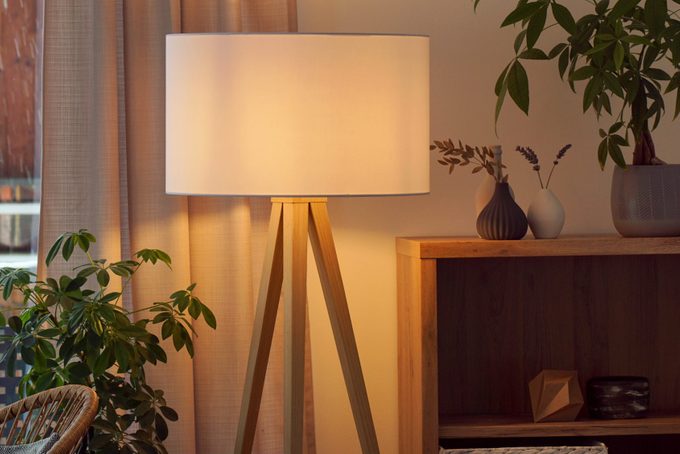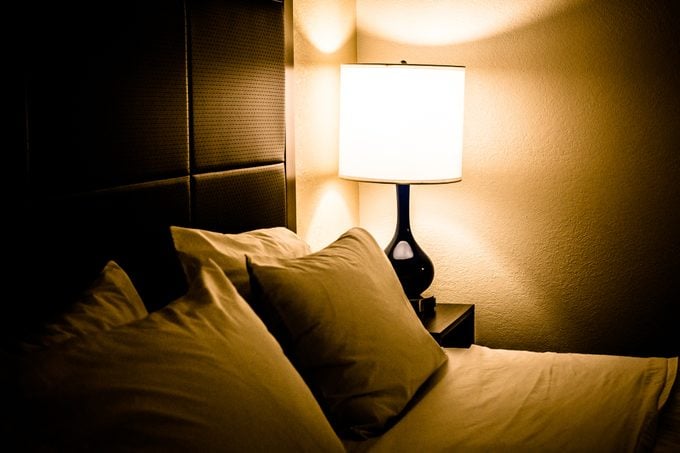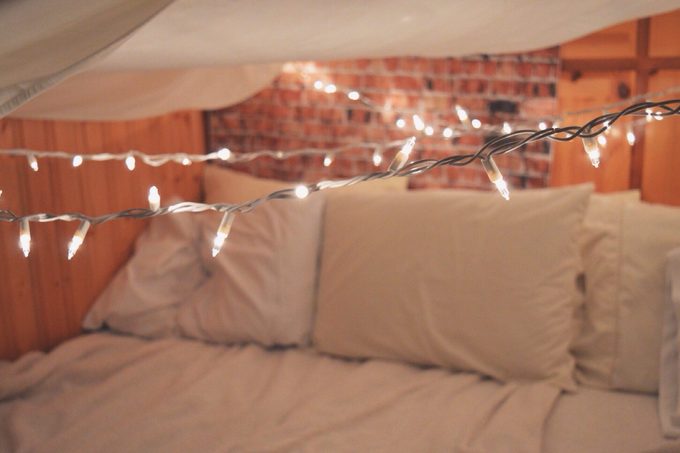Our bedrooms are supposed to be our sanctuaries, our respites, the places where we prioritize rest above all else. But they’re also where we read, do crossword puzzles before bed, dress, pack suitcases and perhaps put on a little makeup.
All those tasks need different types of lighting to avoid frustration, mistakes or insomnia. Jennifer Johnson, CEO of The Light Center, says studies show we need to pay close attention to our bedroom lighting because it greatly affects our sleep patterns.
Luckily, lighting experts have been thinking about how to resolve these issues. Here are a few of their tips for designing light that works in your bedroom.
Outline Bedroom Lighting Needs
Sheva Knopfler, co-founder and creative director of Lights.com, recommends you consider function when addressing bedroom lighting.
“Do you need task lighting for your desk? Perhaps vanity lighting for your makeup? An accent light over your dressing area?” Knopfler says. “It is always necessary to layer light fixtures based on the functionality of your space.”
Remember to prioritize — your bedroom shouldn’t be a catchall. Joel Worthington, president of Mr. Electric, a Neighborly company, says, “The best bedroom lighting ideas should always begin with comfort and relaxation in mind.”
Layer Light
“When it comes to bedroom lighting, it is important to layer your lights,” Knopfler says. “You should have a main source, such as an overhead light, and then accent lighting throughout the room where you see fit.
“For example, place accent lighting at your bedside, so you don’t need to get up from bed to turn out the lights. Some people skip the bedside table lamps for wall sconces, or even small pendant lights for an industrial look. You should also have task lighting at any desk or vanity in your bedroom.”
Johnson says to note the direction the light flows. She suggests uplights, which could include lamps or sconces, mixed with downlight away from our eyes. The latter could be perimeter recessed cans, ceiling lights, sconces or all of the above.
Take the Temperature

Knopfler says warm or neutral white light temperature creates a soothing but functional bedroom. Additionally, all lights should have the same or similar temperature to avoid clashing. She recommends a color temperature between 2,700 and 3,000K, the range often associated with incandescent bulbs.
Worthington recommends warmer or softer-light bulbs, as cooler temperatures can read as daylight or feel cold or clinical. As for LEDs, watch the packaging. Some now come with temperature adjustment options.
And remember: It’s unsafe to modify lights. “Don’t soften or change the color of lamp lights by draping fabric over the lampshade,” Worthington says. “This is a fire hazard. Use lower-light bulbs in your lamps instead.”
Consider Main Light
First: Do you have recessed cans or track lighting? Do you want ambient light? If you do, you may need less power from your main ceiling light and opt for something more decorative. If your main ceiling light is the only option, you want something that throws enough light in multiple directions.
Second: Consider ceiling height. Shorter heights (eight feet or less) will likely need a flush mount, while nine feet or higher can likely accommodate a semi-flush mount. Some semi-flush mounts are oriented more horizontally, squeezing into a lower ceiling height. Higher or vaulted ceilings offer the most options; chandeliers and other larger lights can come into play.
In general, Johnson favors semi-flush mounts for a main ceiling light. They fit most ceiling heights, throw light upward and downward and create ceiling glow. “It uplevels any room in my opinion,” she says.
Before you move forward with installation, consider ceiling fans. Worthington calls them a must. If you opt for one, it will affect your other lighting choices. Some fans have lighting attached, potentially solving two problems at once.
Tackle Bedside Lighting

“Your bedside lamp is the workhorse of bedroom lights,” says Worthington. “It’s the light you turn on when you’re getting ready for bed and when you rise in the morning. It’s the light you count on when you’re startled awake in the middle of the night. It’s probably also your go-to reading lamp.”
Table lamps might do the trick if you have the space. If you’re wrestling with a petite space or don’t have nightstands, consider sconces. They’re available from wired to plug-ins, static to adjustable arms.
“As a Brooklyn-based mom, I fully understand the need for space in small bedrooms,” says Knopfler. “Skip the nightstands and table lamps and install wall sconces on either side of the bed. We even offer renter-friendly plug-in wall lights for apartment living. Not only does this look stylish, but it will save you a few feet in valuable bedroom space.”
To place sconces, she recommends measuring from the floor to the top of the sconce. Aim for roughly 55 to 60 inches high. And if your sconces operate on a switch, review the placement before installing — you’ll need to reach it from the bed.
Increasingly, people are installing pendants over their bedsides for another look. Just be sure the pendants will throw adequate light.
Don’t Forget Dimmers
Lighting experts agree: Dimmers, whether on switches or controlled through apps, are key.
“Control every light as much as you can,” Johnson says. “Lighting without control or dimmers is like music without the volume control.”
Knopfler adds: “The bedroom is supposed to be as calm as it is functional . . . You can fully customize how bright you need the light, and in some cases how low you need it. Not only is this beneficial for overhead lighting, but accent lighting should also be dimmable to your liking.”
Set the Mood
Need an easy, budget-friendly way to add mood lighting? “Plugging in tape light behind a bed headboard might be the single biggest change that is most cost-effective,” Johnson says.
Simple LED tape lighting kits are color adjustable. They can change to music or rotate colors automatically. They’re affordable, too, running about $40 to $55 for a cuttable 36-foot run. No installation is needed.
Don’t Forget a Nightlight
Johnson says nighttime wake-ups require the right light, too. Too bright and your eyes struggle to adjust, which presents safety issues. Plus, it can signal to your brain it’s time to be awake. Too dark, and you risk falling back asleep.
Some outlets — she likes ones from Legrand or Lutron — have nightlights built in. Tape lighting on a motion sensor or plug-in nightlights can also help you get from A to B at night safely.
Have Fun With It

Worthington suggests indoor string lights as another layer option for some sparkle.
“While indoor string lights aren’t for everyone, they can add a little whimsy and a soft glow to a bedroom,” he says. “For children’s bedrooms, string lights make a fun alternative to traditional nightlights.”
Outlining a headboard in white fairy lights or criss-crossing your ceiling with a couple of strings of Edison lights are also great options.
Article source here: Tips for Choosing the Best Lighting for Your Bedroom

No comments:
Post a Comment